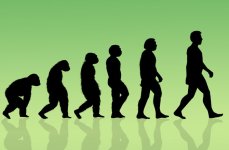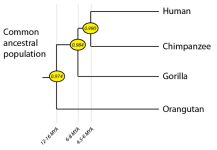Keith&Co.
Contributor
- Joined
- Mar 31, 2006
- Messages
- 22,444
- Location
- Far Western Mass
- Gender
- Here.
- Basic Beliefs
- I'm here...
But no idea is ever so marginalized that SOMEBODY won't suggest revisiting it...
There is no evidence that the passenger pigeon is still evolving. I think we have discovered the way to stop species from evolving.
But no idea is ever so marginalized that SOMEBODY won't suggest revisiting it...
There is nothing so absurd that some philosopher has not already said it.
~ Marcus Tullius Cicero
Blunt stubby teeth are not a lethal genetic defect when you have tools to help you mince your food. Otherwise, they might well be.
The lack of insulin is not a lethal genetic defect when you have tools to help you control your blood sugar level. Otherwise, it might well be.
With enough humans (not) reproducing, patterns emerge in what you call "mere contingencies" that add up to significant selection pressures.
I guess then living in herds for mutual protections, and those herds preventing shrubbery from growing with their grazing behaviour, is wildebeest alteration of the gene pool and not natural selection?
They are not a lethal defect period.
A lethal defect is something that will kill you no matter how you behave.
It is possible to eat many things with blunt stubby teeth.
It is a lethal defect until human technology reaches a point it can be treated.
With enough humans (not) reproducing, patterns emerge in what you call "mere contingencies" that add up to significant selection pressures.
Astrology.
True only if it's truely random. How do you know it is? Why would you even think it is?The humans that do not reproduce are not failing to reproduce due to some specific genetic abnormality.
No genes are being selectively removed.
It has no effect on the future gene pool.
One individual does not reproduce but their sisters do, or their nieces do.
No genes are removed by people randomly not reproducing.
Buying our food in the supermarket is not a conscious choice for most of us either. It's just how one gets food, period.I guess then living in herds for mutual protections, and those herds preventing shrubbery from growing with their grazing behaviour, is wildebeest alteration of the gene pool and not natural selection?
Living in herds is not a conscious choice.
It is not a technology.
It is a behavior.
In an environment where most of the food available requires sharp teeth to even get it into your stomach, they are. The notion "lethal defect period" doesn't make any sense. A trait is always a lethal defect relative to certain environmental parameters.
In an environment where most of the food available requires sharp teeth to even get it into your stomach, they are. The notion "lethal defect period" doesn't make any sense. A trait is always a lethal defect relative to certain environmental parameters.
You are talking about a change of environment. Not an organism already surviving in an environment.
If an environment changes then you don't talk of "lethal defects", you talk about maladaption to a new environment.
And humans have used tools to adapt to new environments.
But child onset diabetes is not maladaption to a new environment. It is a lethal defect.
The creation of insulin is the creation of an artificial environment that never existed naturally.
Science, technology, cheap centralized energy, and abundant food has taken humans out of natural selection. We live in an environment that has no mechanism for natural selection.
Natural selection does not really apply to humans anymore. Childhood inoculations minimize disease that would kill off children with weaker immune systems and genetic deficiencies. Those born with genetic problems survive due to science and technology who would normally not survive childhood.
Those who would likely die young pass on bad genes and harmful mutations.
Through the first half of the 20th century people had many kids because only a few wuld survive.
The creation of insulin is the creation of an artificial environment that never existed naturally.
As is the creation of tools and cooking.
You aren't even trying to argue that point, so just accept that technology is older than you used to believe and move on.
The creation of insulin is the creation of an artificial environment that never existed naturally.
As is the creation of tools and cooking.
You aren't even trying to argue that point, so just accept that technology is older than you used to believe and move on.
I never said technology began with insulin.
But it is a different change than developing tools to overcome weakness in an environment.
It is allowing some who would survive in no previous environment to now survive.
It is a technology that overcomes a lethal genetic defect.
I never said technology began with insulin.
But it is a different change than developing tools to overcome weakness in an environment.
It is allowing some who would survive in no previous environment to now survive.
It is a technology that overcomes a lethal genetic defect.
I hate to repeat myself, but here we go:
JUST; LIKE; COOKING.
If you can actually explain why you think the two are categorically different, go ahead and do so. So far you haven't.
I never said technology began with insulin.
But it is a different change than developing tools to overcome weakness in an environment.
It is allowing some who would survive in no previous environment to now survive.
It is a technology that overcomes a lethal genetic defect.
I hate to repeat myself, but here we go:
JUST; LIKE; COOKING.
If you can actually explain why you think the two are categorically different, go ahead and do so. So far you haven't.
I think what you're trying to say is that speciation is unlikely, which is probably true at least for a very long time. But we're certainly still evolving and changing.
We are socially growing by social natural selection. The failure of global communism and the success of the western systems.
Muttaions occur and are passed on, but there is little in the way of selection to promote benficial mutations over other genes. The impact of passing on bad genes is lessend by tyhe large gene pool and wide open mating.
Procreation has to favor those new beneficial mutations for an evolutionary step by selection.
Evolution doesn't have any kind of 'progressive directionality'.. the direction it moves is the direction it moves.
'Beneficial mutations' are anything that leads to more babies given the current social/environmental context, *not* what makes humans as a whole flourish.


I never said technology began with insulin.
But it is a different change than developing tools to overcome weakness in an environment.
It is allowing some who would survive in no previous environment to now survive.
It is a technology that overcomes a lethal genetic defect.
I hate to repeat myself, but here we go:
JUST; LIKE; COOKING.
If you can actually explain why you think the two are categorically different, go ahead and do so. So far you haven't.
I just explained it.
A person can survive in many environments without cooking.
Cooking is not something that allows somebody to live that could survive in no other environment.
The two are completely different situations.
The only environment a person can survive in that needs insulin is a man-made environment. There is NO natural environment they can survive in. Unlike people that somehow need their food cooked.
The only environment a person who needs their food cooked can survive in is a man-made environment.
The only environment a wildebeest or other herd animal can survive in is a wildebeest-made environment.
Science, technology, cheap centralized energy, and abundant food has taken humans out of natural selection. We live in an environment that has no mechanism for natural selection.
Natural selection does not really apply to humans anymore. Childhood inoculations minimize disease that would kill off children with weaker immune systems and genetic deficiencies. Those born with genetic problems survive due to science and technology who would normally not survive childhood.
Those who would likely die young pass on bad genes and harmful mutations.
Through the first half of the 20th century people had many kids because only a few wuld survive.
- There is still sexual selection
- We are still subject to natural selection by viruses and bacteria
We've been overusing antibiotics for generations now. One by one, bacteria that are dangerous to humans have been developing resistances and immunities to each and every antibiotic that we use. The day is coming soon that all bacteria dangerous to humans will be immune to all antibiotics. If we don't find an alternative means of dealing with bacterial infections by then (e.g. bacteriophage treatments), then we're all going to watch natural selection act on humans at a pretty horrifying scale.
Even if we do find a solution, depending on what solution we find, maybe only wealthy countries will be able to afford the treatment, and we will still be witness to massive amounts of human suffering.
